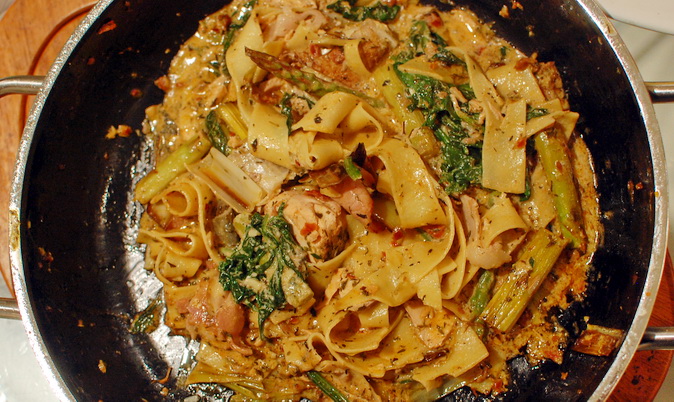It’s a lot simpler if you follow a few basic rules
- Don’t overreach, but push out of your comfort zone
- Don’t explore new horizons at a dinner party; use your best tried and true recipes
- Buy the best / freshest ingredients you can find
- Don’t pay ridiculous prices for cookware, just buy cookware that works reliably
- Organize the production line before you start cooking.
Most dishes have ingredients with different cooking times. An example is my salmon and spinach pappardelle:
I use left-over pasta and salmon from previous meals, then I
- fry the leeks and the thick ends of the asparagus first, for a few minutes
- add the thin ends of the asparagus spears
- fry the spinach in a separate pan for a couple of minutes, then keep it warm in the oven
- add some white wine to the main dish, then the salmon cut into chunks
- add seasoning and herbs, combine (Italian herbs, dill and chives)
- add several tablespoons of pesto – red or green or bothAdd sour cream & combine
- add more wine if necessary (or stock)
- taste, add more seasoning and herbs if needed
- add the pasta and combine
- serve
All this happens at low-to-medium heat over a period of 10 minutes, so I lay all the ingredients out on the bench, in the order they’re needed.
Another example is roast veggies: the carrots and onions go in the oven first, the fennel and capsicum half an hour later, the pumpkin and sweet potato 15 minutes after that, and so on.

What’s the kitchen trick that gets you out of trouble all the time?
Some good advice from serious chefs and foodies, from the Good Food website. I’ve extracted the most useful bits of advice (for me)
Neil Perry: Everyone should have a salad spinner. There’s nothing nice about limp leaves and water dilutes the dressing and therefore the flavour. One of the first things I learnt with Stephanie Alexander was to wash, pick and dry a salad properly.
Andrew McConnell: I organise myself. I organise my head, my space, my ingredients and then – if I’m cooking at home – I can have a glass of wine and relax into it. If you’re not organised, a half-hour recipe can take an hour and a half.
Danielle Alvarez: It sounds silly but adding water. For example, if I’m browning something in a pan and it gets too hot, I add a little water to bring the temperature back down. If I’m sauteing greens, they often brown too much on the outside without cooking through: a little splash of water in the pan creates enough moisture to get into that veg and cook it the rest of the way. I hate soups that are way too thick, like a puree: a couple of tablespoons of water can make it velvety.
What do you think home cooks often do wrong and how can we improve?
Danielle Alvarez: Not adding enough seasoning! It’s a hard lesson to learn because you only learn it over time, and different salts behave differently. To learn how to season, you have to taste your food through the cooking process, not just at the end. Taste everything, even the liquid you’re cooking beans in: is it a flavourful liquid to cook t
Neil Perry: People sometimes think an impressive meal for friends has to be complicated. It doesn’t. Shop well, cook well, and cook within your abilities: don’t push the limits of your capacity when you’re trying to impress. If you want to do something complex, experiment on your husband, your wife, the kids before you unleash it on others.
Kylie Kwong: Menu planning. There is nothing worse than being an exhausted, stressed-out host, so when I plan a dinner party menu, I choose my dishes carefully to be not only seasonal and delicious, but also practical. For example, I love roasting a whole ocean trout as the main dish. I do this several hours in advance, as it can be served at room temperature. I prepare side salads which can be pre-prepped and simply dressed and assembled upon serving. I might have some fried rice pre-cooked which I heat up in the oven, just before serving and perhaps one other hot dish, which I can cook a la minute.
Katrina Meynink: Trying to follow a recipe so closely they forget to have fun. Cooking is a joy. If you are too rigorous and concerned with following a recipe to the absolute letter you don’t get to bring any of yourself to the food. By using a recipe as a guide you learn more about the ingredients you are using, your kitchen appliances and your own skills as a cook. Every time you do this, you are building skills and confidence and the cooking will become more natural and enjoyable.
Is there a recipe of yours in the Good Food book that demonstrates a kitchen principle we all should know?
Neil Perry: With my pan-fried swordfish, I add a little oil to the butter to stop it burning. I generally use a combination of oil and butter when sauteing. It allows you to caramelise and brown beautifully without the butter going too far.
Katrina Meynink: Salt. It’s the single most important ingredient in the kitchen to balance and enhance flavour. When a dish falls short it can be as simple as adjusting the salt, and not just in terms of flakes or crystals but a grating of cheese, pounding a few anchovies, olives or capers. The only way to learn to love it properly is to use it. And to taste. All the time. Gradually add salt and keep tasting to learn how it rounds out, contrasts or intensifies richness.
